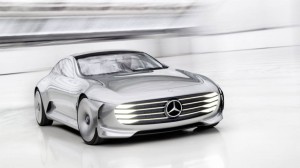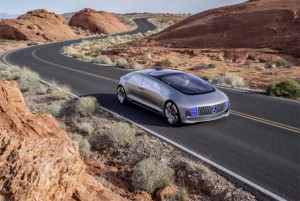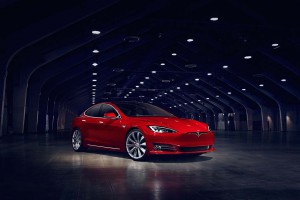Not all that long ago, Tesla and Daimler AG listed each other as partners, the battery-maker’s CEO Elon Musk going so far as to credit the German company with helping keep it in business at a time when Tesla was short of cash.
But that relationship is about to turn into a rivalry. Several reports have suggested Daimler’ Mercedes-Benz brand is working on a high-performance, long-range battery-electric sedan that could take on the California EV maker, and the Germans have now confirmed that plan, with a concept vehicle set to make its debut at the upcoming Paris Motor Show.
Using a “highly efficient lithium ion battery supplied by Daimler’s subsidiary Deutsche ACCUMOTIVE combined with the intelligent Mercedes-Benz operation strategy allows purely battery-driven ranges of up to 500 km (or about 312 miles) for the first time,” says a statement from Mercedes.
Daimler recently announced a broad commitment to zero- and low-emissions vehicles that will be sold through both the Smart and Mercedes brands. These include at least one fuel-cell vehicle and a wide range of plug-in hybrids – 10 PHEVs, in fact, expected to be in the line-up by the end of the year.
(Daimler investing $8 bil in green powertrain tech over next two years. Click Here for the story.)
But it plans to push even further with what it calls, “a fully fledged electric vehicle in the luxury segment that does not cut any corners.”
Make that “vehicles,” as it is working up a “multi-model vehicle architecture” that will be used for a variety of pure battery-electric vehicles, or BEVs. Daimler has already given a hint of what’s in store, it notes, in the form of the F 015 and F 125 research concepts shown in recent years.
Specific details haven’t been released, though the new drivetrain is expected to be all-wheel-drive, in keeping with the direction Mercedes has been going with its performance-focused AMG arm. Whether a more conventional, two-wheel-drive version will also be offered is unclear.
The AWD package would suggest that the performance sedan will rely on at least two electric motors, most likely one at each end. That could help offset the extra mass from a large battery pack – likely consisting of something in the direction of 90 to 100 kilowatt-hours to make 300 miles of range – by eliminating the need for a driveshaft linking front and rear axles.
Having worked with Tesla, Mercedes engineers are familiar with the California carmaker’s design strategy – which places the batteries within the vehicle’s load floor. That approach could yield a dramatically different vehicle layout, reducing the need to stuff a conventional engine compartment. Whether the Mercedes battery sedan will take advantage of that remains to be seen.
With its vast global distribution network and deep pockets, Daimler could be a formidable foe for Tesla, which recently launched a $2 billion stock offering to help finish development of the compact Model 3 sedan.
The question is whether there’s enough room for the two makers in a global battery-car market that has yet to really charge up consumers. But Tesla has already lined up about 400,000 advanced reservations for the Model 3 and is gearing up to boost production for its overall line-up to 500,000 vehicles annually by 2018.
(New Mercedes E-Class enters “gray zone” with its latest, semi-autonomous technology. Click Here for more.)
While it’s not talking numbers, Daimler appears equally confident there’s a market for a no-compromise luxury performance BEV.
It’s not alone. Audi is also working up a long-range entry, albeit one targeting the booming global utility vehicle market. The Audi model is set to go on sale in 2018. BMW is also planning to expand its battery-based options, both through its main brand and through the special electric sub-brand that currently offers both the i3 city car and i8 plug-in. Other luxury brands, from Aston Martin to Volvo, are also planning to launch BEV models of their own over the next several years.
A key reason is the Chinese market where government regulators are pressing hard for zero-emission alternatives to help address the country’s endemic smog problems. In Europe, meanwhile, a number of cities, including London and Paris, are also looking to foster emissions-free transportation. And with the 2025 Corporate Average Fuel Economy standards looming in the U.S., automakers will also need to push more battery-based models into their fleets.
New, lower-priced and more energy-dense batteries will help enhance the appeal of these offerings, experts contend, as will expanded availability of high-speed charging systems. Mercedes will include the new Combined Charging System, or CCS, into the upcoming battery-sedan set to debut in Paris.
(Click Here for a look at the new Mercedes-AMG GT R.)



